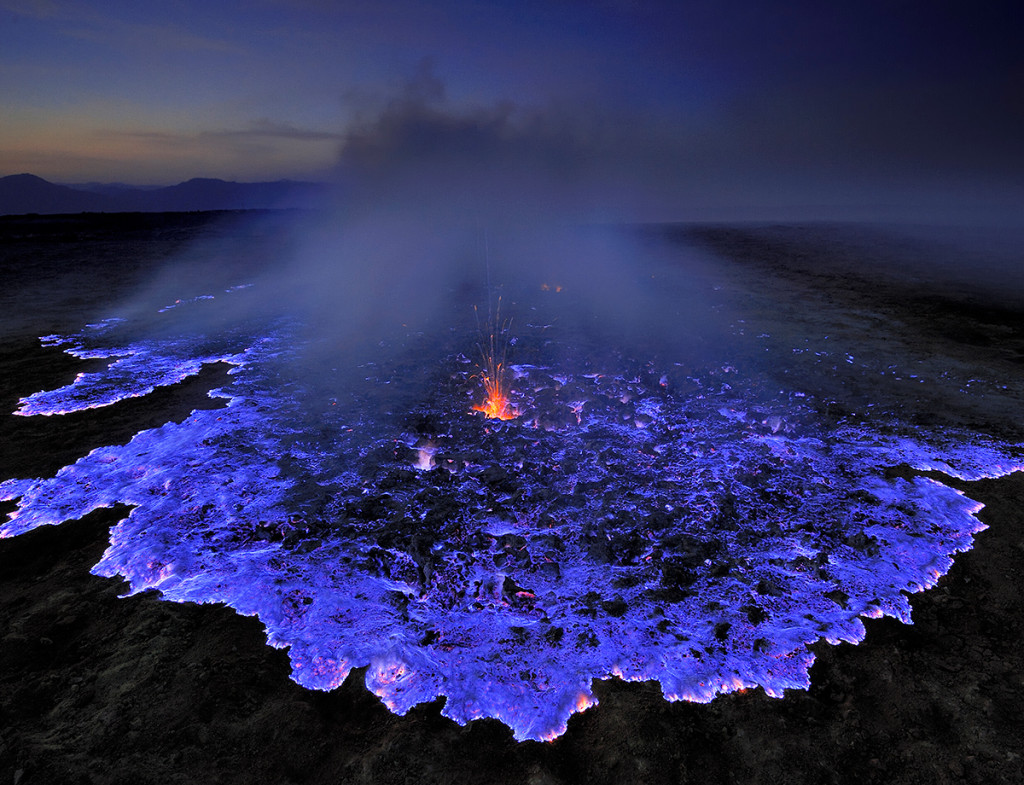By MICHAEL GADD FOR MAILONLINE
If we must imagine the fiery depths of hell, the mental image can’t be far from these incredible images by Karel Tupy of Ethiopia’s Erta Ale, the world’s oldest continuously active lava lake.
Photographer Tupy, 35, says he feared his camera would melt from the overwhelming heat of the lava as he captured the daunting scenes of the 150-ft wide basalt volcano.
‘The view is simply staggering,’ said the 35-year-old. ‘Lava inside the volcano is constantly moving, bubbling and bursting.’
Mental images of the fiery depths of hell can’t be far from these very real photographs of Ethiopia’s Erta Ale
These incredible images by Czech photographer Karel Tupy capture the world’s oldest continuously active lava lake
Lava sprays from the centre of the lake, a rare phenomenon said to be one of just six in the world
Lava illuminates, peeks through cracks and spits (left) and a haze forms above the blazing hot pool in shot by the adventurous 35-year-old
‘The heat was immense, when I got to an edge of the crater, it was unbearable. After couple of seconds, my facial skin was so hot, I had to get away.
‘There was even a point where I was afraid my camera was going to melt.’
Found in the badland desert area of the Afar Depression in north-eastern Ethiopia, Erta Ale’s famed lava lake formed around 1906 and is one of six in the world.
The volcano’s name translates in the local Afar tribe’s language as ‘smoking mountain’ while the pit to its south is known by locals as ‘The Gateway to Hell’, an appropriate moniker given the luminous lava spitting lava and searing heat.
Karel Tupy said the view is ‘staggering’, as lava inside the volcano is constantly moving, bubbling and bursting
Erta Ale’s name translates as ‘smoking mountain’ in the local Afar language while the pit to its south is called ‘The Gateway to Hell’
While locals aren’t particularly welcoming to outsiders and the surrounding terrain is far from hospitable, tourists do make the journey to witness the natural phenomenon.
In 2009, BBC TV show The Hottest Place On Earth went there to record a world first 3D laser image of the volcano. Durham University earth scientist Dr Dougal Jerram and a team from the BBC explored the Danakil desert, officially known as the hottest place on Earth.
‘Like a true journey to the centre of the Earth, volcanoes provide a unique window into our planet’s interior,’ he later wrote for BBC News. ‘Standing at the lip of the lava lake you can see why the locals see this as “The Gateway to Hell”, as the incandescent bubbling lava lake hisses like some badly burned porridge cauldron, overturning and occasionally belching molten lava.’
A visitor mounts his camera on a tripod in a bit to capture the volcano in its full glory while a small group of tourists line the other side
The ferocity of the volcano is clear as lava splashes up from a pool that is said to have formed around 1906
Having gained his own access to the area, in which five people in a group of scientists and tourists were killed while others were taken as hostages in a 2012 attack claimed by the Afar Revolutionary Democratic Unity Front (ARDUF), Tupy couldn’t agree more with Dr Jerram’s impression.
‘Even though the lava is about 25 feet below the edge, sometimes during a burst the lake spits the lava outside the crater, so you have to be careful not to get hit by it,’ he said.
‘What you get hit by quite often though is fumes.’
The photographer says while it’s vital to avoid contact with lava, obviously, it’s the fumes that can be the worry
Poor road access means the only way to efficiently get to the crater is via four-wheel-drive over rugged terrain
A far less dramatic sight, the lava forms a hard, grey layer when it is given the chance to cool
However, the environment gets far worse that what he experienced.
In September 2005 an eruption killed 250 head of livestock and forced locals in the surrounding area to flee. There were further evacuations in August 2007 caused by lava flow, after which two people went missing. The most recent eruption came in November 2008
‘This place is something you don’t see every day,’ said Karel. ‘As a photographer, I get to see amazing places and when you see that people like those photos. This is kind of a reward in itself.’
Read more: The Daily Mail
